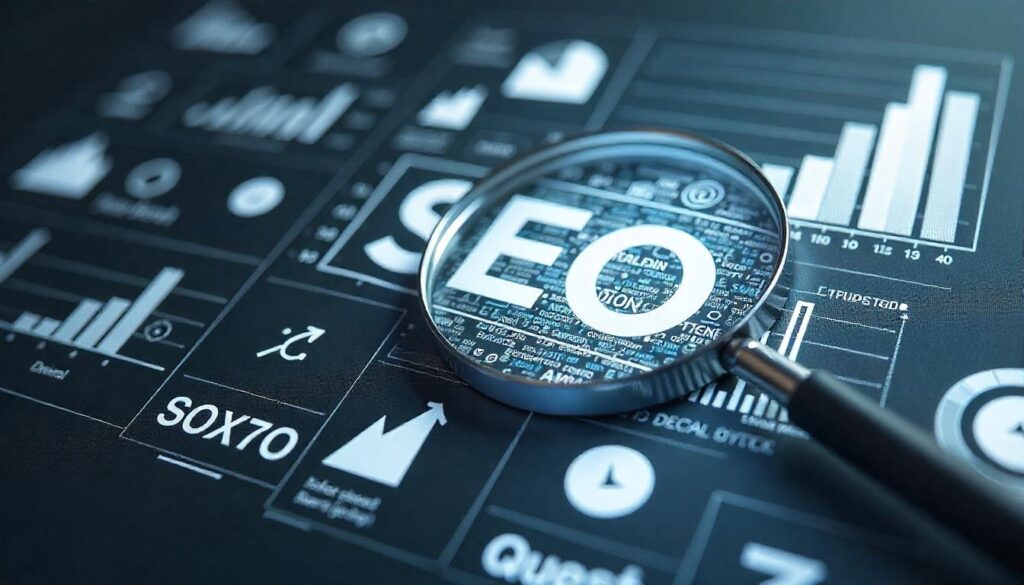Search Engine Optimization (SEO) is still one of the most effective ways to grow your business online in 2025. It helps websites rank higher on search engines like Google and attract more visitors. But like any strategy, it has its good and bad sides. In this detailed guide, we will explain 12 advantages and disadvantages of SEO in 2025 to help you understand it better and make the right choices for your business.
What is SEO?

SEO, or Search Engine Optimization, is the process of improving your website so it shows up higher on search engine results. This means more people can find your website when they search for something related to your business. For example, if you run a bakery, you want your website to appear when people search for “best cakes near me” or “custom birthday cakes.” SEO makes this happen by focusing on things like keywords, website speed, and user experience. Understanding the advantages and disadvantages of SEO can help you decide how to use it effectively.
Advantages of SEO in 2025
1. Increased Organic Traffic
Organic traffic refers to visitors who come to your website through search engines without you paying for ads. One of the biggest advantages of SEO is that it helps bring in this kind of traffic. For example if someone searches for “affordable car repair” and your website is optimized for this phrase, your site will show up on the search results.

This means you get more visitors who are genuinely interested in your services. Organic traffic is free and can significantly boost your sales.
2. Cost-Effective Marketing Strategy

SEO might require an initial investment in tools, hiring experts, or creating content, but it’s much cheaper in the long run compared to paid advertising. For example, if you run Google Ads, you pay every time someone clicks on your ad. With SEO, once your website is well-optimized, it can keep bringing in traffic without extra costs. This makes it an affordable option for businesses of all sizes.
3. Enhanced User Experience
Search engines like Google prioritize websites that provide a good experience for users. This includes fast loading times, easy navigation and mobile friendliness. SEO helps you improve these aspects making your website more enjoyable for visitors. For example, a fast loading page keeps users from leaving out of frustration. A good user experience not only helps your SEO but also keeps visitors coming back.
4. Builds Credibility and Trust
When your website shows on the first page of Google, it indicates to users that your business is trustworthy and reliable. People tend to trust search engines to deliver the best results. For example if a healthcare website ranks for “best cardiologist near me” users are more likely to trust it and book an appointment.

SEO helps build this trust by making your website look professional and reliable.
5. Long-Term Results

Unlike paid ads, where traffic stops as soon as the campaign ends, SEO provides long-term benefits. Once your website ranks well, it can stay there for months or even years with minimal maintenance. For example, a blog post optimized for “how to bake bread” can continue attracting visitors as long as the content remains relevant. This makes SEO a smart long-term investment.
6. Competitive Advantage
Many businesses are using SEO but not all of them do it well. If you invest in advanced techniques like optimizing for voice search or using artificial intelligence, you can stay ahead of your competitors. For instance, if two companies sell the same product, the one with better SEO will appear higher in search results and get more customers.
7. Local SEO Benefits Small Businesses

Local SEO is perfect for small businesses that want to attract customers in their area. For example, a coffee shop can optimize for “best coffee shop near me” or “freshly brewed coffee in [city name].” Local SEO tools like Google My Business make it easier for small businesses to show up in local searches bringing in more customers from their neighborhood. Among the list of advantages and disadvantages of SEO local optimization is especially valuable for smaller businesses looking to establish themselves.
8. Data-Driven Insights
SEO tools provide detailed data about how people interact with your website. This includes information about what keywords they use, where they come from and what pages they visit. For example if a clothing store sees that most visitors search for “summer dresses” they can create more content and promotions around this keyword. These insights help businesses make smarter decisions.
9. Scalable Marketing Approach
Whether you’re running a small startup or a large corporation, SEO can grow with your business. For example a small bakery can start by targeting local keywords and later expand to broader terms as it grows. SEO allows businesses to scale their efforts according to their goals and budget.
10. Improves Conversion Rates
SEO doesn’t just bring traffic; it brings the right kind of traffic. When your website targets specific keywords, you attract people who are actively looking for your products or services. For instance, a travel agency optimizing for “affordable holiday packages” is likely to get visitors who are ready to book trips. This increases the chances of turning visitors into customers.
11. Supports Other Marketing Strategies
SEO works well with other marketing channels like social media and email campaigns. For example, a blog post optimized for “best skincare tips” can be shared on social media attracting even more traffic. SEO strengthens your overall marketing efforts by providing high quality content that can be used across platforms.
12. Adaptable to New Trends
SEO constantly evolves with changes in technology and user behavior. For example, voice search and mobile first indexing have become important trends in recent years. SEO helps businesses adapt to these changes and stay relevant. By staying updated you can ensure your website meets the latest standards and continues to perform well.
Disadvantages of SEO in 2025
1. Takes Time to Deliver Results

SEO is not a quick fix. It often takes months to see significant improvements in rankings and traffic. For example, if you start optimizing your website today it might take 3-6 months to rank for competitive keywords like “best online shopping sites.” Businesses looking for immediate results may find this frustrating. This is one of the major disadvantages when weighing the advantages and disadvantages of SEO.
2. Highly Competitive
As more businesses invest in SEO, the competition to rank higher becomes tougher. For example, if you run a fitness blog, you may compete with hundreds of other websites for keywords like “best workout routines.” Standing out in such a crowded space requires a lot of effort and creativity.
3. Algorithm Changes
Search engines like Google frequently update their algorithms. These changes can affect your rankings overnight. For instance a website relying heavily on backlinks might lose rankings if Google introduces stricter rules about link quality. Staying updated with these changes requires constant learning and adaptation.
4. Requires Continuous Investment
Although SEO is cost effective in the long run but maintaining it requires ongoing investment. This includes creating fresh content, performing regular audits and updating old pages. For example, a tech blog might need to update its “best smartphones” article every year to stay relevant. The need for continuous work is one of the disadvantages in the list of advantages and disadvantages of SEO.
5. Uncertain ROI
While SEO is effective the return on investment (ROI) is not always predictable. Factors like competition, keyword difficulty and market trends can impact results. For example, a business might invest in optimizing for “best pizza delivery” but if competition increases, it might take longer to see returns.
6. Complex and Technical
SEO involves many technical aspects like website speed, structured data, and mobile optimization. For businesses without technical expertise, this can be overwhelming. For example, setting up schema markup to improve search visibility requires specific knowledge and tools.
7. Dependent on Search Engines
Relying heavily on SEO means your success depends on search engines. If Google penalizes your website or changes its rules then your traffic could drop significantly. Diversifying your marketing efforts can reduce this dependency.
8. No Guaranteed Results
Even with the best strategies, SEO success is not guaranteed. Competitors might outrank you, or search trends might change. For example, a website targeting “home gym equipment” might lose traffic if demand for such products decreases.
9. Content Overload
To rank higher, many businesses produce large amounts of content, which can lead to lower quality. For example, a travel blog might publish too many articles on similar topics causing readers to lose interest. Balancing quality and quantity is essential.
10. Challenging for New Websites
New websites often struggle to compete with established ones. Building authority and trust takes time. For example, a new fashion blog might find it hard to rank for “latest fashion trends” against well-known websites.
11. Local SEO Limitations
While local SEO is helpful, it has its limits. For example, a small business in a remote area might not attract enough customers even with perfect optimization. Businesses in low-demand areas may need additional strategies to succeed.
12. Risk of Black-Hat Techniques
Some businesses use unethical practices like buying backlinks or overusing keywords to achieve faster rankings. These black hat techniques can cause penalties and harm your website’s reputation. For instance keyword stuffing might boost rankings temporarily but will eventually lead to penalties from search engines.
Balancing the Pros and Cons of SEO
Understanding the advantages and disadvantages of SEO is essential for making informed decisions. While SEO offers long term benefits like increased traffic and credibility its challenges require consistent effort and adaptability. Businesses must focus on creating high quality content, staying updated with trends and avoiding shortcuts to succeed.
Conclusion
In 2025 SEO remains a vital strategy for online success. By utilizing its benefits and overcoming its challenges businesses can strengthen their digital presence and achieve lasting growth. Whether you are a startup or a large corporation investing in SEO is a wise choice to stay competitive in the online marketplace. By weighing the advantages and disadvantages of SEO carefully, you can create a strategy that works best for your goals.
Frequently Asked Questions
1. What are the advantages and disadvantages of SEO for small businesses?
SEO offers cost-effective ways for small businesses to gain visibility and attract local customers, but it requires consistent effort and time to see results.
2. How does SEO compare to paid advertising?
While SEO takes longer to show results, it is more affordable in the long run compared to paid ads that stop bringing traffic once the budget ends.
3. Can SEO guarantee top rankings?
No, SEO does not guarantee top rankings due to factors like competition, algorithm changes, and market trends.
4. What are the common challenges of SEO?
Some challenges include staying updated with algorithm changes, creating high-quality content, and competing in saturated markets.
5. How do algorithm updates affect SEO strategies?
Algorithm updates can change ranking factors, requiring businesses to adapt their strategies to maintain or improve rankings.
Images By: FreePik


